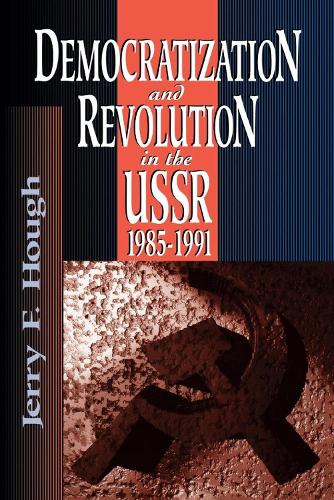
Democratization and Revolution in the USSR, 1985-91
(Paperback)
Publishing Details
Democratization and Revolution in the USSR, 1985-91
By (Author) Jerry F. Hough
Bloomsbury Publishing PLC
Brookings Institution
1st May 1997
United States
Classifications
Professional and Scholarly
Non Fiction
Political structures / systems: democracy
321.80947
Physical Properties
Paperback
560
Width 152mm, Height 227mm, Spine 36mm
857g
Description
"
Democratization and Revolution in the USSR, 1985-91 presents a strikingly new view of the Gorbachev era and the reasons for the collapse of the Soviet Union. Written by one of America's most distinguished specialists on the former Soviet Union, this is the first comprehensive overview of the Gorbachev period and describes it as a real revolution, not mere ""reform.""
According to Hough, despite Mikhail Gorbachev's talk of a regulated market, he never understood that a market must be created on a solid institutional and legal base. He was determined to use democratization to free himself from party control, but he saw democracy as a way of achieving near- universal consensus, not a mechanism for forcing through difficult choices. The many memoirs that have become available in the last few years, including those of Gorbachev himself, show that Premier Nikolai Ryzhkov and the ""bureaucrats"" in his government actually were the serious economic reformers in the leadership. Gorbachev opposed the key transitional steps at every stage and was far closer to the assumptions of shock therapy than he or his opponents ever recognized.
Hough explains that Gorbachev was not alone in thinking that the destruction of old institutions was enough to unleash a market. Westerners also talked of leaping a chasm in a single jump as if democratic and market institutions existed pre-created on the other side. But, precisely because Gorbachev (and later Boris Yeltsin) was encouraged in all his worst mistakes by Western advice, his failure has crucial implications for Western thinking about the process of democratization and marketization. This unprecedented book explores those implications in depth.
Selected by Choice as an Outstanding Book for 1998
"Author Bio
"Jerry F. Hough is professor of political science and public policy at and a nonresident senior fellow at the Brookings Institution. His books include Democratization and Revolution in the USSR, 1985-1991 (Brookings, 1997) and Russia"
